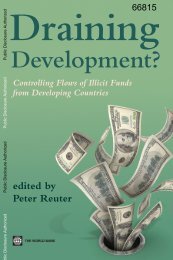International Trade in Services.pdf - DSpace at Khazar University
International Trade in Services.pdf - DSpace at Khazar University
International Trade in Services.pdf - DSpace at Khazar University
Create successful ePaper yourself
Turn your PDF publications into a flip-book with our unique Google optimized e-Paper software.
212 <strong>Intern<strong>at</strong>ional</strong> <strong>Trade</strong> <strong>in</strong> <strong>Services</strong><br />
Table 6.6. A Checklist of Questions on <strong>Trade</strong>-Rel<strong>at</strong>ed Aspects of Construction<br />
Service Reform (cont<strong>in</strong>ued )<br />
8. Do local or foreign contractors follow any of the anticorruption guidel<strong>in</strong>es provided<br />
by, for example, Transparency <strong>Intern<strong>at</strong>ional</strong><br />
Does local government have an anticorruption str<strong>at</strong>egy <strong>in</strong> place for government<br />
procurement Would the country benefit from sign<strong>in</strong>g the WTO Agreement on<br />
Government Procurement<br />
Facilit<strong>at</strong><strong>in</strong>g commercial presence<br />
1. Are there legal restrictions to market entry through commercial presence by foreign<br />
contractors If so, wh<strong>at</strong> types of restrictions are there, and wh<strong>at</strong> are their impact on<br />
foreign direct <strong>in</strong>vestment Wh<strong>at</strong> is the motiv<strong>at</strong>ion for impos<strong>in</strong>g the restrictions<br />
2. Is there a requirement for foreign contractors to form jo<strong>in</strong>t ventures with local<br />
contractors Have such jo<strong>in</strong>t ventures been successful and fulfilled the prospective<br />
motiv<strong>at</strong>ion of foster<strong>in</strong>g the transfer of technology and management knowledge<br />
Have they helped build local expertise <strong>in</strong> the <strong>in</strong>dustry<br />
3. Are potential restrictions to commercial presence compliant with the country’s<br />
prospective WTO commitments<br />
4. How does competition law deal with cartels<br />
5. Do foreign contractors need to register and obta<strong>in</strong> licenses th<strong>at</strong> are different<br />
(for example, <strong>in</strong> terms of costs) from the licenses required of local contractors<br />
6. Are there staff<strong>in</strong>g requirements for the establishment of branch offices Are there<br />
requirements th<strong>at</strong> foreign contractors must hire local executives<br />
7. Can the policy r<strong>at</strong>ionale of restrictions be addressed through other, less<br />
trade-restrictive means<br />
Facilit<strong>at</strong><strong>in</strong>g the temporary movement of service providers<br />
1. Wh<strong>at</strong> types of restrictions exist on foreign providers of services Does the country<br />
impose bans, quotas, economic needs tests, or other impediments to the movement<br />
of project staff<br />
2. If a quota system is <strong>in</strong> place, does the labor quota change frequently<br />
3. Are the rules different for <strong>in</strong>tracorpor<strong>at</strong>e transferees and contractual service providers<br />
4. Is there implicit or explicit discrim<strong>in</strong><strong>at</strong>ion with regard to the n<strong>at</strong>ionality of service<br />
providers<br />
5. Is the applic<strong>at</strong>ion process for bus<strong>in</strong>ess visas and work permits adm<strong>in</strong>istered <strong>in</strong> a<br />
reasonably expedient and cost-effective way Or is it opaque, slow, and<br />
cumbersome Wh<strong>at</strong> can be done to improve adm<strong>in</strong>istr<strong>at</strong>ive efficiency <strong>in</strong> the<br />
applic<strong>at</strong>ion process<br />
6. Are there restrictions or other issues rel<strong>at</strong>ed to the nonrecognition of qualific<strong>at</strong>ions for<br />
construction workers <strong>at</strong> home or <strong>in</strong> major export markets<br />
7. Are there domestic regul<strong>at</strong>ions th<strong>at</strong> have an adverse effect on foreign providers of<br />
services or th<strong>at</strong> affect their welfare or the local labor market (for example, discrim<strong>in</strong><strong>at</strong>ory<br />
remuner<strong>at</strong>ion and benefit structures) Do local policies give rise to illegal migr<strong>at</strong>ion<br />
8. Wh<strong>at</strong> are the policy objectives of the restrictions Can the policy r<strong>at</strong>ionale be<br />
addressed through other, less trade-restrictive means<br />
Review<strong>in</strong>g other trade-distort<strong>in</strong>g rules and regul<strong>at</strong>ions<br />
1. Wh<strong>at</strong> types of subsidies are provided to contractors oper<strong>at</strong><strong>in</strong>g <strong>in</strong> the local market Are<br />
subsidies alloc<strong>at</strong>ed <strong>in</strong> an equitable way or tied to specific criteria (if so, wh<strong>at</strong> are the<br />
criteria)

















